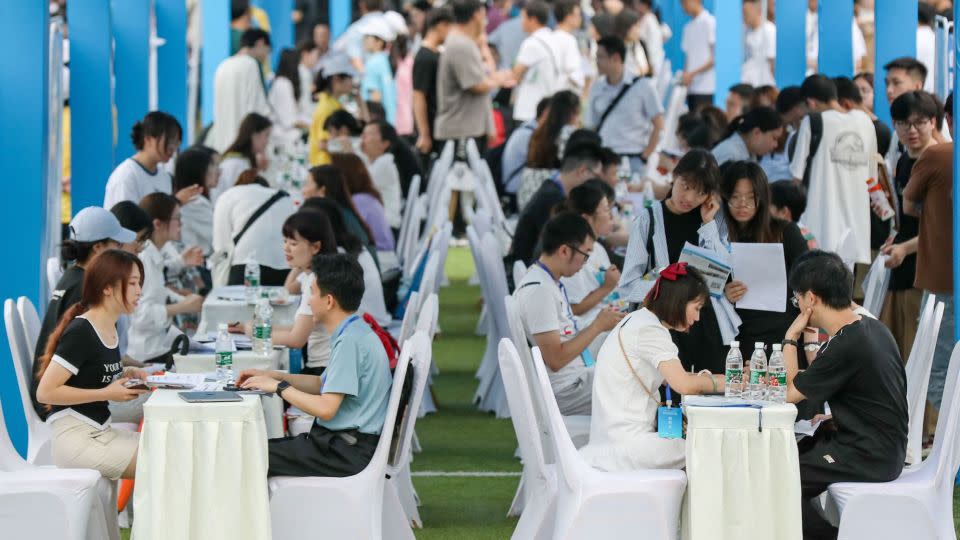Why China’s young people are quitting their jobs and throwing ‘resignation parties’
On the day Liang resigned from his banking job in China’s Zhejiang province, his friends threw a party and congratulated him by beating gongs and drums, in an echo of traditional marriage rituals.
His friends, who had also quit their jobs, pinned a flower on Liang’s chest under a scarlet banner that read: “We’re done with this bullsh*t job!”
Around them hung lanterns, banners and “double happiness” signs typically seen during weddings, while tables overflowed with food.
Every partygoer received an invitation stating: “Hope you eat well and drink well, escape from the bitterness as soon as possible.”
It may seem strange to celebrate leaving a stable job with an enviable salary, especially amid China’s gloomy economic prospects and record high youth unemployment rate, when such positions are in short supply.
But Liang, 27, who has since become a content creator while running a café, said he has become happier since quitting in May, a sentiment shared online by many others in similar circumstances.

“I fell into mechanized, repetitive work. It consumed a lot of my energy,” he told CNN, adding that he felt stifled creatively at a bank’s public relations department. “Your innovative ideas would have been dismissed and vanish eventually.”
CNN is identifying Liang with a pseudonym for privacy reasons.
Hundreds of posts about resignation parties have spread on Chinese social media this year, as the country slowly emerges from its Covid-19 cocoon of isolation and grapples with the economic and social fallout. Most of the people participating in the trend are in their 20s, citing various reasons for quitting ranging from low wages to burnout.

According to China’s LinkedIn equivalent Maimai, out of 1,554 employees across various sectors surveyed from January through October 2022, 28% resigned that year. The number doubled for those who intended to quit but hadn’t yet done so.
A similar movement, dubbed the Great Resignation, had taken off in the United States, with almost 50 million people quitting their jobs in two years. While the phenomenon is petering out in the West, it seems to be just getting started in China.
Disillusionment is high among overworked young people who have spent their lives competing against each other academically and climbing the corporate ladder, only to find little satisfaction.
Experts say the trend could exacerbate the country’s growing economic headaches, as a falling birthrate and shrinking workforce spell trouble for future growth — and for generations of Chinese youth.
The school rat race
Many children in China begin the educational rat race at a young age, with years of after-school tutoring and high-pressure exams culminating in the dreaded “gaokao” college entrance exam — which most students get just one shot at.
“I think people in the West, people outside of China, don’t understand how hard it is to be a child [there],” said Nancy Qian, a professor of economics at Northwestern University’s Kellogg School of Management. “The youth are dealing with a lot of disappointment and pent-up exhaustion and resentment from working so hard.”
Many grew up during a time when the economy was running at full speed and the future seemed promising. But, as the products of the one-child policy, which was relaxed only in recent years as authorities tried to reverse the falling birth rate, they’ve had to deal with high parental expectations while competing in a cutthroat system.

They were told the sacrifices would all work once they became financially successful, Qian said. Instead, they’ve been confronted with the realities of unprecedented unemployment rates and stagnating salaries due to a sluggish economy and intense overwork culture.
“It undermines the morals and work ethic they’ve been taught their whole lives,” Qian said. “They are totally burned out.”
And while older generations focused on simply making ends meet, young adults growing up in a more prosperous era want meaning and purpose, which their jobs often failed to offer.
A market mismatch
That sense of disillusionment is heightened by what experts say is a mismatch between people’s education levels and their skills, and the jobs available.
China has built the world’s largest education system, with university enrollment almost doubling in just ten years to 57.8% in 2021, according to the Ministry of Education.
However, Yao Lu, a sociology professor at Columbia University, found in her research that a significant proportion of employees are overqualified for their jobs, meaning their positions do not require the skills and knowledge they learned at school.
“They are working in jobs that may be relatively stable, may pay reasonably well, but those are jobs that don’t typically need a college degree,” such as administrative roles in local district offices and food delivery drivers, she said.
This mismatch has serious social consequences including the employees’ often low levels of satisfaction with their lives and their jobs, she added.

Veyron Mai, a resident of the southern city Foshan, graduated with a bachelor’s degree in music, but was unable to secure a job as a music teacher. He eventually turned to blue-collar work and tried car washing before becoming a restaurant server.
He recalled working in the summer heat and using “strongly corrosive” cleaning materials.
“Even if you wear gloves, it still hurt your hands and made them ugly. After I worked there for a month, I felt ashamed showing other people my hands. How can I call myself a music student?”
Lu said there was a “structural imbalance” between supply and demand.
Despite the proliferation of higher education degrees, China’s economy doesn’t currently require as many high-skilled workers and it takes time to transform the economic structure, she said.
Fewer workers?
The mismatch in the labor market is likely be a long-term issue, which is not good news for the economy as it faces obstacles on multiple fronts.
For years, China’s fertility rate has been falling, meaning fewer babies and a shrinking group of working-age adults. Meanwhile, the country’s elderly population is rapidly aging, resulting in a rising demand for pension funding, health care and other welfare services.
Against this backdrop, “the worst case scenario is if the dispirited youths permanently drop out of the labor force, which will mean even fewer workers to support the elderly in the years to come,” said Qian.
The resignation trend could affect fertility, but it’s not yet clear how, she said.
Young adults freed from grueling work hours could have more time to focus on relationships and start families, she said — or they could further delay that process due to “income loss and depressed emotions.”
“Anything that pushes fertility rates even lower is a serious concern for the future,” she said.
Many of those resigning from their jobs aren’t leaving the workforce entirely.
Those who spoke to CNN or who have written about their experiences online have moved to other positions or other industries. And it’s unclear how long this trend will last.
Liang now runs a cafe in Taizhou, an eastern city ringed with mountains and a coastline. “At my age, I can just quit when I want to,” he said. “But maybe after a year or two, I’ll have to go back to the workplace dejectedly.”
For more CNN news and newsletters create an account at CNN.com
